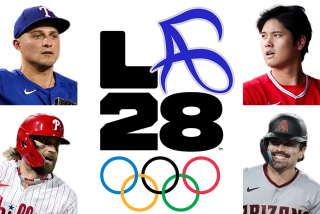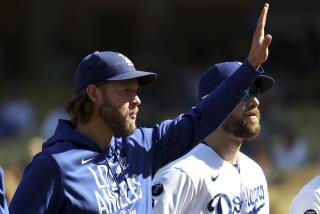STRIKE III : Tuesday’s Games Called Off, but Talks Go On, Sparking Hopes of Fast Accord
NEW YORK — The 650 major league baseball players went on strike Tuesday, despite hours of continuing contract talks that gave rise to hopes that their dispute with the owners would soon be settled.
After more than six hours of daytime negotiations at a secret uptown Manhattan location, Donald Fehr, leader of the players’ union, told newsmen:
“We do not have an agreement, and since we do not have an agreement we are advising players not to report to stadiums tonight. . . . I can hold no hope out specifically of any progress sufficient to point us in the direction of an agreement.”
Two hours later, the American and National Leagues officially postponed all 13 games on Tuesday night’s schedule.
Despite Fehr’s words, however, the situation appeared both confused, and in some respects, hopeful.
Within 90 minutes of the union leader’s statement, negotiations resumed and Peter Ueberroth, baseball commissioner, issued this statement:
“The negotiations reconvened at 5:30 p.m. (EDT). They must be allowed a full opportunity to conclude their efforts and hammer out a settlement. We do not anticipate further comment or action by the commissioner until the results of tonight’s meeting are known.”
Ueberroth had declared at a ceremony in Cooperstown, N.Y., July 28 that he would not allow a strike. Tuesday, while he took no immediate steps to try to block the walkout, his statement at least implied that he might do something of an unspecified nature if it continued.
Meanwhile, the confusion continued. Some teams were reported to be remaining in the cities where they were scheduled to play, rather than dispersing and leaving for home. Others traveled to new playing locations. At least one team, however, the New York Mets, did return home--from Montreal, where they had been scheduled to play Tuesday night.
The Dodgers remained in Atlanta, where they had been scheduled to play the Braves, but only after first having been advised to leave.
Mike Scioscia, Dodger player representative to the union’s executive council, told a Times reporter that at 4:15 p.m., EDT, he had been told by union counsel Eugene Orza that the Dodgers should return to Los Angeles. Less than an hour later, however, Scioscia said that he had been told by union negotiator Mark Belanger that the new negotiating session was about to begin, that a settlement was possible Tuesday night and that the team could stay put.
A Times reporter was also told that Peter O’Malley, Dodger owner and a member of the Player Relations Committee that is in the midst of the negotiating, sent a message through his public relations department to Scioscia that the odds of a settlement Tuesday were 60-40. The implication was that Scioscia should keep the team around Atlanta so it could be on hand to play Wednesday.
But players on other teams, including the Angels, responded to that report in discussions with other Times reporters as being a possible ploy by management to make the negotiations seem more promising than they really were. And early in the evening, the Angels called off their Wednesday afternoon game.
In contrast to Monday, when each side’s negotiators questioned the other side’s motives, there was a notable lack of rhetoric after the day session Tuesday.
In fact, there was no public discussion of the issues by either side, and no word as to details of the negotiating process.
Ueberroth remained in his office and took no direct part in the talks.
Bob Fishel, owners’ spokesman, said that Ueberroth was “very active,” but there was no clear demonstration of exactly what he was doing. In fact, union representatives said that, to their knowledge, Ueberroth was playing no vital role in the negotiating process.
Monday night, however, it was Ueberroth who had requested that the sides meet again and at 8:45 a.m. Tuesday, the negotiators met again for what were first described as informal talks.
There was no further word for four hours. But at 1 p.m., Fishel said they had broken for lunch and would shortly resume. He said he was uninformed as to the status of the negotiations.
Presumably, however, the main subjects under discussion were the salary arbitration and pension issues that had deadlocked the talks Monday.
The owners had proposed at that time that eligibility for salary arbitration change from two years of major league service to three, and that a 100% cap be put on awards of salary increases in the arbitration process from one year to the next. The union rejected both ideas.
On pensions, the owners, who have been paying $15.5 million a year into the players’ pension fund, were offering as much as $25 million. The players were demanding about $42 million annually.
Fishel said that Tuesday’s postponements might not be very serious if a settlement were reached soon. And it was learned later that the games would be treated as if they were rainouts, meaning the owners would lose the dates, but the games would be made up as doubleheaders and the players would be paid for the game. That assumed, of course, that the strike would be settled in short order.
“You can always adjust something like that,” Fishel said.
More to Read
Go beyond the scoreboard
Get the latest on L.A.'s teams in the daily Sports Report newsletter.
You may occasionally receive promotional content from the Los Angeles Times.










